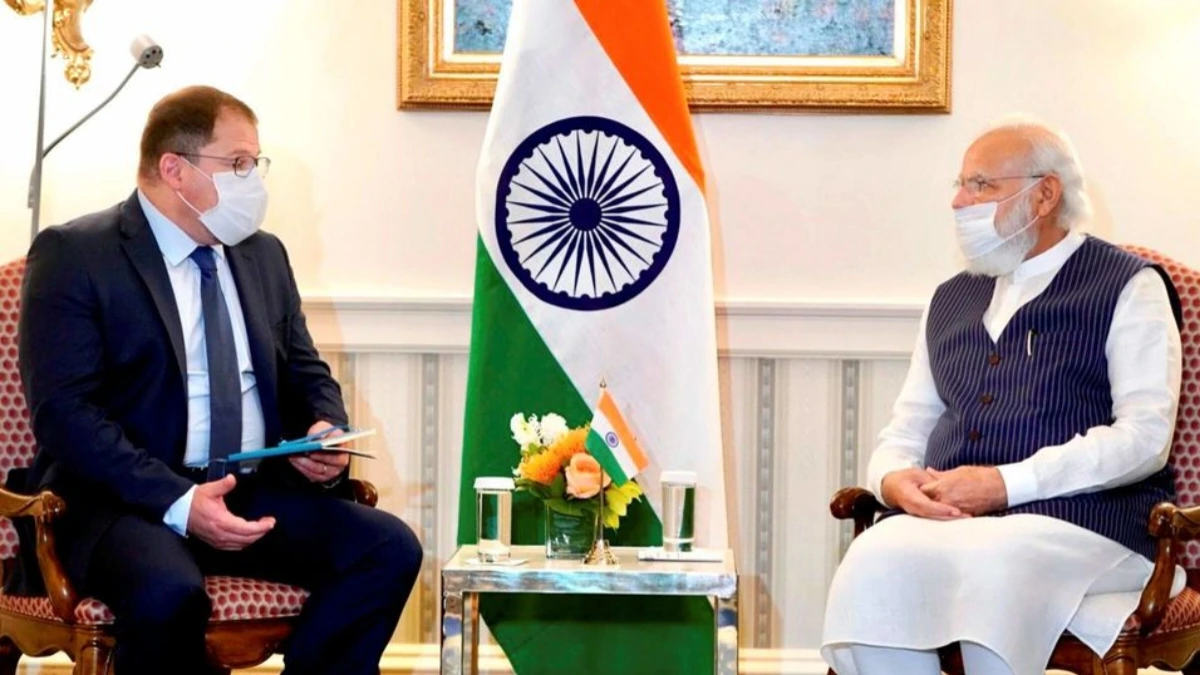NEW DELHI — Indian Prime Minister Narendra Modi met Qualcomm President and CEO Cristiano Amon in New Delhi on Saturday to discuss opportunities in artificial intelligence, semiconductor manufacturing, and digital innovation, Modi’s office said in a statement.
“Great to see Qualcomm’s commitment towards India’s semiconductor and AI missions,” Modi said in a post on X after the meeting.
The conversation underscored New Delhi’s push to strengthen partnerships with leading US technology companies as part of its broader strategy to develop a self reliant chip ecosystem and drive innovation in emerging technologies.
The meeting came as Qualcomm faces heightened scrutiny abroad. On Friday, China’s State Administration for Market Regulation announced an antitrust investigation into the US chipmaker over its acquisition of Israeli automotive chip designer Autotalks.
The Chinese regulator said it would examine whether Qualcomm violated domestic antitrust laws by failing to declare details of the acquisition.
The timing of the investigation drew attention in diplomatic circles, as it coincided with deepening US India cooperation on technology and supply chain resilience, particularly in semiconductors.
India has sought to attract global semiconductor giants amid rising geopolitical competition between Washington and Beijing.
India is positioning itself as a trusted global semiconductor hub, said Dr. Kavita Menon, a technology policy expert at the Centre for Strategic Studies in New Delhi.
“Partnerships with companies like Qualcomm are vital to achieving that goal, especially as the global tech landscape becomes more fragmented.”
Qualcomm’s engagement with India aligns with its global strategy to expand manufacturing and research operations outside China.
The company already runs significant engineering and design centers in Hyderabad and Bengaluru, employing thousands of Indian professionals in chip design and 5G technology.
The discussions likely focused on collaborative research in AI and chip design, as well as opportunities for joint development with Indian startups, said Rakesh Bhatia, a senior analyst at TechSphere Research.
India’s growing digital ecosystem provides a testing ground for AI driven applications, from agriculture to health care. For Modi, attracting semiconductor investments remains central to his “Digital India” initiative.
The government recently unveiled a $10 billion incentive scheme to support chip manufacturing, drawing interest from companies including Micron, Foxconn, and Vedanta.
Qualcomm’s potential participation would mark a significant milestone in India’s ambitions to become a global semiconductor player.
India’s semiconductor market is projected to reach $63 billion by 2026, according to industry estimates from the India Electronics and Semiconductor Association.
Meanwhile, global demand for AI enabled chips continues to surge, fueled by applications in automation, robotics, and data analytics.
The United States remains the world’s largest exporter of semiconductor intellectual property, while China leads in assembly and packaging.
India, by contrast, is seeking to bridge this gap through targeted foreign partnerships, workforce training, and incentives for domestic fabrication plants.
“Unlike past efforts that failed due to lack of infrastructure and scale, the current policy framework is more pragmatic and globally integrated,” said Menon. “India is learning from Taiwan, South Korea, and Japan’s playbooks.”
At Qualcomm’s Bengaluru campus, engineers expressed optimism about the renewed focus on India’s AI and semiconductor potential.
“This meeting gives us confidence that our work in AI driven communications will gain greater global relevance,” said Sneha Rao, a senior software engineer at Qualcomm India.
There’s a sense of pride in contributing to a sector that’s being recognized at the highest levels of government. Local entrepreneurs also see opportunities emerging from the collaboration.
“If companies like Qualcomm invest more deeply in India, it could transform the startup ecosystem,” said Arjun Patel, founder of an AI based traffic management startup in Pune. “Access to advanced chipsets and R&D partnerships would fast track innovation.”
The meeting reflects a broader realignment of global technology supply chains, as nations seek diversification and resilience in critical sectors such as semiconductors.
India’s engagement with Qualcomm, alongside other US and European firms, is expected to continue in the coming months through forums like the US/India Initiative on Critical and Emerging Technology.
Analysts caution, however, that building a robust chip ecosystem will take time. Infrastructure bottlenecks, skill shortages, and global competition for advanced fabrication capacity remain major challenges.
Still, the symbolic weight of Saturday’s meeting suggests momentum is building. “It’s not just about chips,” said Bhatia. “It’s about trust, technology sovereignty, and strategic alignment in a rapidly evolving world.”
As Qualcomm navigates regulatory challenges in China, its engagement with India highlights a strategic pivot toward markets aligned with the United States’ vision of secure and diversified technology ecosystems.
Modi’s meeting with Amon underscored India’s growing importance in global tech diplomacy and its determination to position itself at the center of the next generation of AI and semiconductor innovation.
